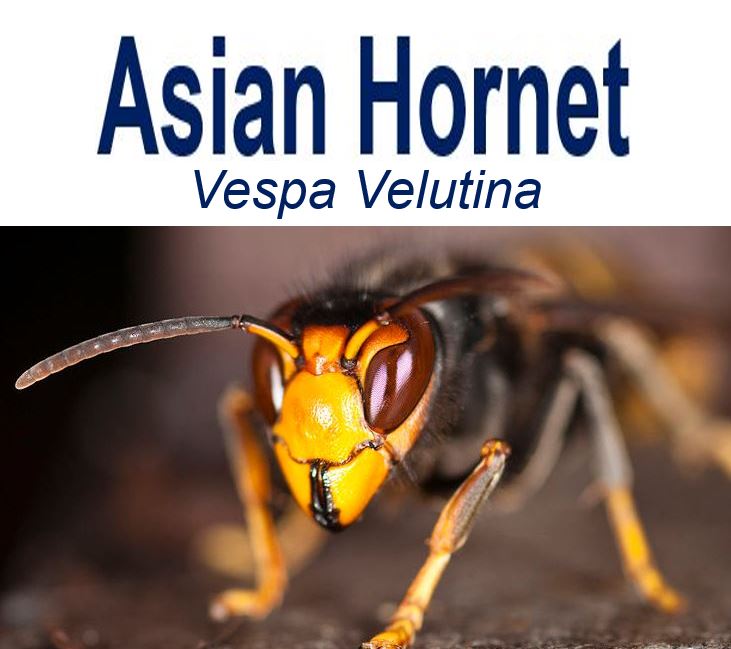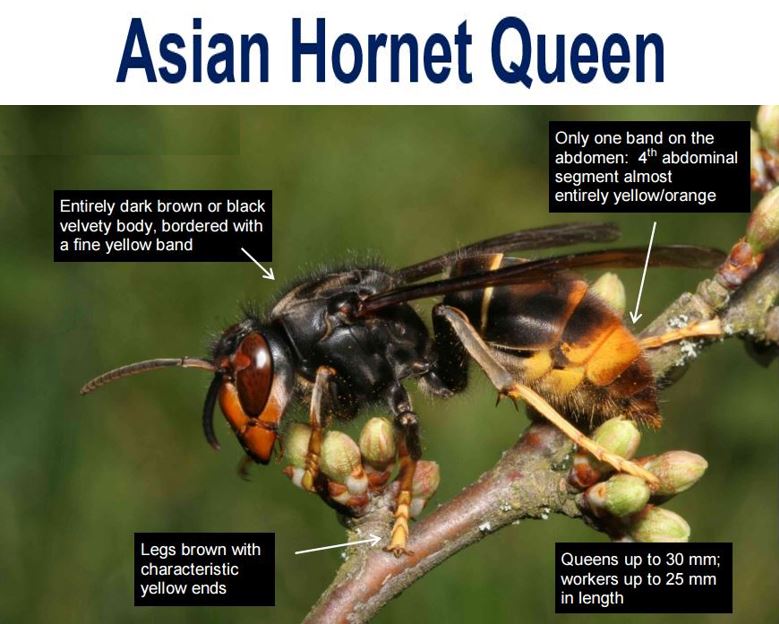British experts are concerned that killer Asian hornets, which have so far killed six humans in France, could be blown over the channel by the wind onto the shores of Kent and Sussex and then spread across the country. Health authorities insist the Asian hornet is no more dangerous to people than native European hornets, adding that all the deaths in France were from anaphylactic shock (individuals with sting allergies).
A spokesperson for Defra (Department for Environment, Food and Rural Affairs) emphasized that the concern is regarding the Asian hornet, and not the more deadly Asian giant hornet.
According to the British Beekeepers Association (BBA), the Asian Hornet (Vespa velutina), also known as the Yellow-Legged Hornet, is an invasive non-native species from Asia. It arrived in France eleven years ago and has been spreading rapidly.

An Asian hornet (Vespa velutina). (Image: Wikimedia)
A House of Commons Environmental Audit Committee report on invasive non-native species warned last year “The Asian Hornet, which might soon arrive here, has killed six people in France.”
Vespa velutina is a voracious predator of insects, including honeybees and other beneficial species. Experts say it can cause considerable losses to bee colonies, other native species and possibly also ecosystems.
Although not yet present in Britain, the Asian hornet is likely to arrive soon, says the BBA. It is most likely to be seen first in southern parts of England. It could cross the channel from France, blown over by wind, or arrive hidden in imported goods, especially in soil with imported pot plants, cut flowers, fruit and timber.
The Independent quoted a Defra Spokesperson who said:
“There have been no confirmed sightings of Asian hornets in the UK. We are aware of the potential impacts they could have on honey bees and have plans in place to remove them if they are identified.”
“This includes comprehensive monitoring and teams ready to destroy any confirmed nests.”
How to identify Asian hornets
– The queen is up to 3 cm long, while the workers are up to 2.5 cm (marginally smaller than Vespa crabro, the native European hornet).
– They have an entirely black or dark brown velvety body, bordered with a fine yellow band.
– There is one band on the abdomen. The 4th abdominal segment is almost completely orange/yellow.
– Their legs are brown with yellow ends.
– The head is black, while the face is yellow-orange.
According to the BBA:
“Vespa velutina is a day flying species which, unlike the European hornet, ceases activity at dusk.
If you believe you have spotted an Asian hornet, take a photograph and email it with details of where it was identified plus your contact information to the Non-Native Species Secretariat ([email protected]).
Only if it is safe, send a sample to the National Bee Unit. “However, do not under any circumstances disturb or provoke an active hornets’ nest,” The BBA adds.

Key ID features of the Asian Hornet queen. (Image: bbka.org.uk)
Bee populations vulnerable
Asian hornets, which raid hives and feed on bees’ honey, are not only a serious threat to vulnerable people, but could also devastate the UK’s honeybee population.
French beekeepers have reported plummeting honey production and a dramatic decline in honeybee populations, partly due to attacks by Asian hornets.
The invasive hornets hover in front of beehives and pick off single honeybees, decapitating them and pulling off their legs and wings, before flying off with the torso to feed their young.
Their tactic is also to kill off bees one by one until the colony is exhausted. They then invade the hive and take the honey.
French experts believe it entered France in 2004 in some Chinese pot plants.
Defra Asian hornet nest alert
Defra has issued an e-mail alert to British beekeepers to look out for Asian hornet nests, which typically are located in garages, sheds and tall trees.
If you suspect you have seen a nest do not approach it, Defra says. You should either contact your local council or look for a local pest control company.
Councils and pest control companies have been told to contact the National Bee Unit if they find an Asian hornet’s nest. The Unit will send experts from the Animal Health Veterinary Laboratories Agency to destroy them with specially-made chemicals.
Last year, the Government prepared an emergency plan in case the Asian hornets were discovered in Britain. A new law was announced in the Queen’s speech, which gives officers powers to enter private property and destroy new invasive species.
Chairman of the Norfolk Beekeepers’ Association Carolyne Liston, said:
“They are a very, very aggressive predator. They wait by the entrance and grab foraging bees as they come back into the hive. They can absolutely decimate bee colonies.”
“We are concerned they are going to come into Britain on someone’s caravan who has been travelling in France.”
Originates from Southeast Asia
Vespa velutina originates from Southeast Asia, particularly the tropical regions, from Thailand, Laos, Vietnam, Malaysia, the Indo-Chinese peninsula and surrounding islands, Burma, China, Bhutan, as well as Northern India, Pakistan and Afghanistan.
As an invader, the hornet has appeared in Japan, South Korea, Portugal Spain and France. Entomologists (insect experts) believe several countries in Europe will soon be invaded.
